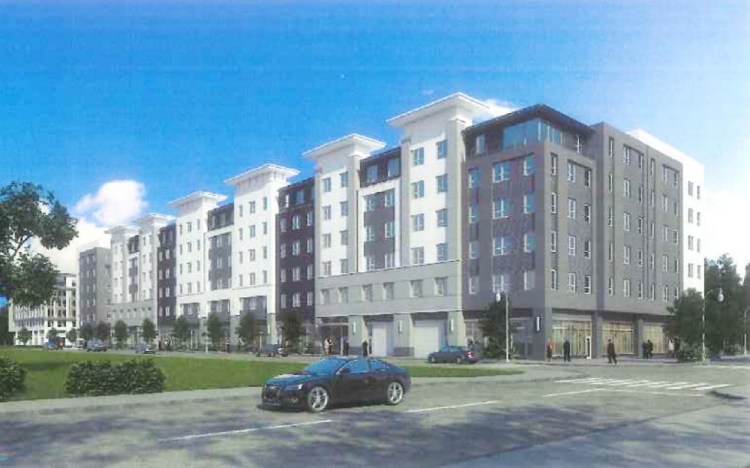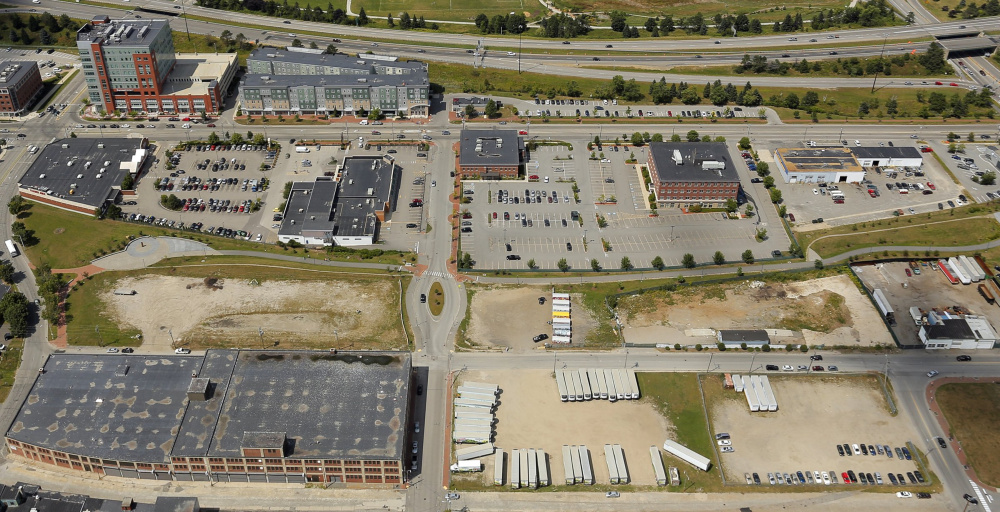City officials aren’t revealing details of new plans apparently in the works for the much-anticipated and long-delayed Midtown housing project in Portland’s Bayside neighborhood.
City Manager Jon Jennings recently told about 30 residents that the developer is interested in constructing taller buildings than currently planned and adding hotel and office uses to a mix that had included housing and some ground-floor retail, according to people who attended the Bayside Neighborhood Association’s annual meeting Sunday.
When asked about the meeting Wednesday, Jennings declined to confirm or elaborate on what he told the association’s members about the project.
“We are actively engaged with the developer and have had very productive conversations about how to move the project forward,” Jennings said. “We are excited about new ideas they have that could include changes to the overall development project.”
Developer Jonathan Cox, founder and chairman of the Florida-based Federated Cos., also declined to comment about the status of the project.
Meanwhile, as the project is quietly being reevaluated, Portland residents have already paid more than $100,000 in interest on a federal loan that the city took out to finance a parking garage for the project.
The prospect of more changes in design and uses raises questions about what – if anything – will be built on the roughly 3.5-acre weed-strewn lot on Somerset Street that Federated bought in June. The land had once been targeted for as many as 800 units of much-needed downtown housing.
Amendments to the purchase-and-sale agreement approved by the City Council before the June closing removed a time line for the project to break ground, said Greg Mitchell, the city’s economic development director.
The time line originally was included to allay concerns that Federated would sit on the land and not develop it. But the time line was removed once city officials believed that Federated was fully invested in the property because it paid more than $2 million for the land and millions more in other costs to get project approval.
“It was felt that (the lengthy planning process and investment) was enough of a financial incentive for the project to move forward in a realistic time frame,” Mitchell said.
The current agreement with the city only binds the developer to complete construction of an 840-vehicle parking garage, 180 units of housing and 50,000 square feet of retail space within three years. But those conditions only take effect if Federated uses at least $1 million of a federal loan being funneled through the city.
Mitchell said the city is currently paying interest on the $8.2 million loan from the U.S. Department of Housing and Urban Development. The city has planned to pay back that loan with the additional property taxes generated by redevelopment of the property, which would have increased the assessed value by a minimum of $45 million.
So far, with no new tax revenue coming in, the city has paid roughly $131,600 in interest, said Brendan O’Connell, the city’s finance director.
The potential that a third design is taking shape is the latest twist – and potentially another delay – in a five-year effort to redevelop the former industrial land. And it could bring the project full circle, in terms of height.
The entire project has nearly been derailed twice: once by a lawsuit and again over the developer’s previous request to build a hotel.
Shortly after Federated received approvals to build four, 165-foot-tall residential towers in January 2014, a group called Keep Portland Livable filed a lawsuit to reduce the size of the project, which would have been built over a 10-year period.
As originally proposed, there would have been 650 to 800 units of housing in the 15-story buildings, with retail space on the first floor. The first phase would have been a tower with 235 units, a 705-vehicle parking garage and retail.
However, Federated settled the lawsuit out of court by agreeing to scale down the project. By March 2015, Federated had received approvals to build 445 apartments in three six-story buildings with first-floor retail, along with an 800-vehicle parking garage. The project would have been built in one phase.
Several months later, Federated contacted the city about potentially adding a hotel to the site, prompting the city to declare its sales agreement void. Federated, which was concerned it had missed the window for residential development, responded by threatening to sue the city.
After another delay, the City Council approved changes to the purchase-and-sale agreement in May. Federated closed on the purchase in June, paying $2.3 million for the property.
Bayside residents had a mixed response to the prospect of another revision, according to several people who attended Sunday’s meeting. The Bayside Neighborhood Association has advocated vigorously for more year-round residents in the neighborhood.
Association President Steve Hirshon confirmed that Jennings talked about the possibility of taller buildings, as well as office and hotel uses, but Hirshon indicated there is not enough information available for the association to take a position.
Association Vice President Laura Cannon, who also attended the meeting, was not surprised that the developers were seeking changes. She runs or walks regularly on the Bayside Trail, which borders the development site, and has not noticed any construction. Cannon said she is not personally concerned about building heights, and would like to see year-round residential units.
“The height just kind of scares people as a concept. That’s a philosophical question that people have to deal with,” Cannon said. “I am open. I am willing to listen.”
Association board member Sean Kerwin, who is married to Cannon and attended the meeting, is both excited and anxious about the potential changes. He preferred the original design over the compromise, he said. He too would like to see a strong residential presence.
“There’s a lot of fatigue all around, but we’re not just going to support something to get something done,” Kerwin said. “There’s a strong sense were going to hold out for something we see as a positive. Version 1.0 was there, and Version 2.0 was pretty close.”
He added: “That’s not to say we’re not sick and tired of this process – because we are.”
Send questions/comments to the editors.





Comments are no longer available on this story